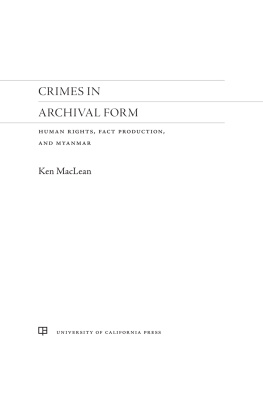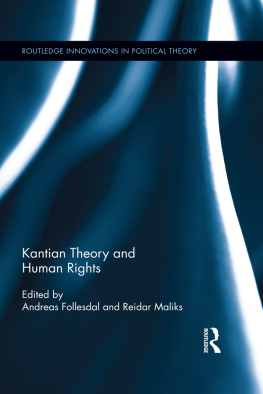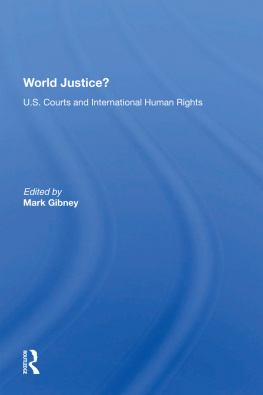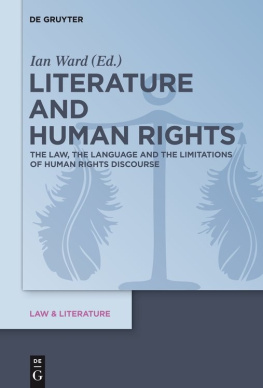CRIMES IN ARCHIVAL FORM
CRIMES IN ARCHIVAL FORM
HUMAN RIGHTS, FACT PRODUCTION, AND MYANMAR
Ken MacLean

UNIVERSITY OF CALIFORNIA PRESS
University of California Press
Oakland, California
2022 by Ken MacLean
Library of Congress Cataloging-in-Publication Data
Names: MacLean, Ken, author.
Title: Crimes in archival form : human rights, fact production, and Myanmar / Ken MacLean.
Description: Oakland,California : University of California Press, [2022] | Includes bibliographical references and index.
Identifiers: LCCN 2021037034 (print) | LCCN 2021037035 (ebook) | ISBN 9780520385382 (cloth) | ISBN 9780520385405 (paperback) | ISBN 9780520385412 (epub)
Subjects: LCSH: Human rightsBurmaCase studies. | Crimes against humanityBurmaCase studies. | Victims of violent crimesBurmaCase studies. | BurmaPolitics and government21st century.
Classification: LCC JC599.B932 M34 2022 (print) | LCC JC599.B932 (ebook) | DDC 323.09591dc23
LC record available at https://lccn.loc.gov/2021037034
LC ebook record available at https://lccn.loc.gov/2021037035
The author acknowledges permission from the poet and translator to reprint Tee Noe, I Do Need Peace, translated by Violet Cho and first published in Transnational Literature 6, no. 2 (May 2014): 23.
Manufactured in the United States of America
31 30 29 28 27 26 25 24 23 22
10 9 8 7 6 5 4 3 2 1
I Do Need Peace
without notice
suffering came quick to greet us:
soldiers
rapid
they burnt our house
an annihilated place.
rice barns to ashes
our food lost
inhabiting the forest deep
as the enemy searched for us
in the basket, father took me away
my village
I can never see again.
Tee Noe
Contents
Acknowledgments and Dedication
Authors acknowledgments typically include the admission that it is impossible to thank everyone who played a role in the books completion. That is the case here. But rather than include a long, but inevitably partial, list of names (family, friends, colleagues, reviewers, editors, and so on), I wish to both recognize and to dedicate this work to the thousands of ordinary people whose traumatic experiences form the evidentiary core of my book. It is a troubling but unavoidable fact that books on human rights violations utilize these experiences to make arguments and to advance conclusions that the victims will never ever read or directly benefit from. Again, that is the case here. However, I hope the claims I make in the book will inform the future work of not only academics but also policymakers and human rights activists who seek to connect theory with practice in a manner that contributes to justice for all victims of state-sponsored violence.
Abbreviations
AAPP | Assistance Association for Political Prisoners |
CBO | community-based organization |
CIDKP | Committee for Internally Displaced Karen People |
CoI | commission of inquiry |
CSO | civil society organization |
DKBA | Democratic Karen Buddhist Army |
FBR | Free Burma Rangers |
ICC | International Criminal Court |
IDP | internally displaced person |
IHRC | International Human Rights Clinic at Harvard Law School |
ILO | International Labour Organization |
INGO | international nongovernmental organization |
ISO | International Standards Organization |
KHRG | Karen Human Rights Group |
KNLA | Karen National Liberation Army |
KNU | Karen National Union |
KORD | Karen Office for Relief and Development |
KRC | Karen Relief Committee |
MIMU | Myanmar Information Management Unit |
ND-Burma | Network for Human Rights Documentation-Burma |
NGO | nongovernmental organization |
NLD | National League for Democracy |
NRDC | Natural Resource Defense Council |
NSAG | non-state armed groups |
SLORC | State Law and Order Restoration Council |
SPDC | State Peace and Development Council |
TBBC | Thai-Burma Border Consortium |
UNHCR | United Nations High Commissioner for Refugees |
UNSC | United Nations Security Council |
Notes on Terminology
First, the question of whether to use Burma or Myanmar when referring to the country is a politically charged one, so I address it at the outset. Proponents of one or the other justify their positions by citing different moments in history, defining inclusiveness in conflicting ways, and invoking alternate linguistic practices. I would much prefer to use the combined form, Burma/Myanmar, to visually remind readers that the countrys name was disputed during the period covered in the book and, equally importantly, that these battlespaces continue to be a source of conflict today. (Though not discussed in this book, the 2021 coup exemplifies my point.) However, in recent years, Myanmar has almost entirely replaced Burma, even among people who resisted military rule for decades. I follow common usage, except where Burma appears in the source material, for this reason.
Second, in Myanmar, the standard name for non-state armed groups (NSAGs) is ethnic armed organizations (EAOs). However, the term elides the fact that many of the countrys minority populations regard the states national armed forces (Tatmadaw, which literally means Royal Force) to be an EAO as well, on the grounds that it represents the interests of Burmans, the dominant ethnic group, at the expense of non-Burmans. I use the neutral label NSAGs to avoid erasing this widely shared view on the Tatmadaw.
Third, the Myanmar Information Management Unit (MIMU), which operates under the United Nations resident and humanitarian coordinator, has assigned unique place codes to approximately 75 percent of the countrys villages. Each place code includes GPS locational data and an English transliteration of the village name based on a standardized system MIMU developed. A village may lack an official place code for several reasons, however. Remoteness is a common one. But decades of armed conflict have also reshaped where people live and the names they give to places they reside, which may or may not be recognizable as villages from an administrative perspective. Additionally, many of the villages mentioned in this book are located in territory (formerly) controlled by a NSAG, which does not always want the precise GPS coordinates known to the government. Finally, different linguistic groups sometimes assign the same place different names, which further complicates matters. To minimize confusion and to avoid the introduction of errors, I use the place-names that appear in the original source material, the spelling of which in transliterated form is not always consistent both within and across fact-finding organizations.
Introduction
Next page








